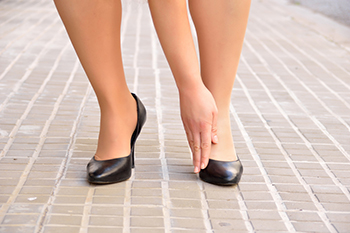Town Square Family Foot Care has permanently closed.
Dr. Scholz has accepted a position as a Podiatrist in the Department of Orthopedics and Rehabilitation at University of Iowa Health Care. If you’d like to schedule an appointment, call 319-356-2223.
If you would like to have your records sent to another provider, please send a record release form found on our website, 341foot.com, to our secure email contactus@341foot.net.
Blog

The toe box of a shoe plays a significant role in foot health by determining how much space the toes have to move naturally. When a shoe's toe box is too narrow or short, it can lead to various foot problems, including blisters, corns, calluses, and ingrown toenails. Over time, shoes with a tight toe box may contribute to misaligned toes, inflamed nerves, and pain in the ball of the foot. People who frequently experience discomfort in the toes while wearing shoes may have a foot shape that requires a wider or deeper toe box. Shoes with a design that follows the natural contours of the foot can help reduce pressure points and prevent long-term complications like bunions. High heels and narrow dress shoes often force the toes into an unnatural position, increasing the risk of foot pain and deformities. A podiatrist can assess your foot structure, identify any issues related to improper footwear, and recommend shoes that provide better support. If you have foot pain connected to improper footwear, it is suggested that you schedule an appointment with a podiatrist for treatment options.
It is important to find shoes that fit you properly in order to avoid a variety of different foot problems. For more information about treatment, contact Jill Scholz, DPM from Town Square Family Foot Care. Our doctor will treat your foot and ankle needs.
Proper Shoe Fitting
Shoes have many different functions. They cushion our body weight, protect our feet, and allow us to safely play sports. You should always make sure that the shoes you wear fit you properly in order to avoid injuries and deformities such as: bunions, corns, calluses, hammertoes, plantar fasciitis, stress fractures, and more. It is important to note that although a certain pair of shoes might be a great fit for someone else, that doesn’t mean they will be a great fit for you. This is why you should always try on shoes before buying them to make sure they are worth the investment. Typically, shoes need to be replaced ever six months to one year of regular use.
Tips for Proper Shoe Fitting
- Select a shoe that is shaped like your foot
- Don’t buy shoes that fit too tight, expecting them to stretch to fit
- Make sure there is enough space (3/8” to ½”) for your longest toe at the end of each shoe when you are standing up
- Walk in the shoes to make sure they fit and feel right
- Don’t select shoes by the size marked inside the shoe, but by how the shoe fits your foot
The shoes you buy should always feel as good as they look. Shoes that fit properly will last longer, feel better, and improve your way of life each day.
If you have any questions, please feel free to contact our office located in Coralville, IA . We offer the newest diagnostic and treatment technologies for all your foot care needs.

Clubfoot is a congenital foot deformity that occurs when a baby is born with one or both feet twisted in an abnormal position. It can be caused by a combination of genetic and environmental factors, although the exact causes are not always clear. One of the primary characteristics of clubfoot is midfoot cavus, which refers to a high arch in the middle of the foot. Forefoot adductus is another common feature, where the front part of the foot turns inward. The heel or hindfoot varus causes the heel to turn inward, leading to an abnormal walking posture. Hindfoot equinus is also present in many cases, where the foot points downward, limiting normal movement. While clubfoot can vary in severity, early diagnosis and treatment, often involving stretching, casting, or surgery, can correct the condition and allow children to walk without limitations or discomfort later in life. If your child has been born with clubfoot, it is strongly suggested that you include a podiatrist on your healthcare team who can provide exceptional care for this condition.
Congenital foot problems require immediate attention to avoid future complications. If you have any concerns, contact Jill Scholz, DPM of Town Square Family Foot Care. Our doctor can provide the care you need to keep you pain-free and on your feet.
Congenital foot problems are deformities affecting the feet, toes, and/or ankles that children are born with. Some of these conditions have a genetic cause while others just happen. Some specific foot ailments that children may be born with include clubfeet, polydactyly/macrodactyly, and cleft foot. There are several other foot anomalies that can occur congenitally. What all of these conditions have in common is that a child may experience difficulty walking or performing everyday activities, as well as trouble finding footwear that fits their foot deformity. Some of these conditions are more serious than others. Consulting with a podiatrist as early as possible will help in properly diagnosing a child’s foot condition while getting the necessary treatment underway.
What are Causes of Congenital Foot Problem?
A congenital foot problem is one that happens to a child at birth. These conditions can be caused by a genetic predisposition, developmental or positional abnormalities during gestation, or with no known cause.
What are Symptoms of Congenital Foot Problems?
Symptoms vary by the congenital condition. Symptoms may consist of the following:
- Clubfoot, where tendons are shortened, bones are shaped differently, and the Achilles tendon is tight, causing the foot to point in and down. It is also possible for the soles of the feet to face each other.
- Polydactyly, which usually consists of a nubbin or small lump of tissue without a bone, a toe that is partially formed but has no joints, or an extra toe.
- Vertical talus, where the talus bone forms in the wrong position causing other bones in the foot to line up improperly, the front of the foot to point up, and the bottom of the foot to stiffen, with no arch, and to curve out.
- Tarsal coalition, when there is an abnormal connection of two or more bones in the foot leading to severe, rigid flatfoot.
- Cleft foot, where there are missing toes, a V-shaped cleft, and other anatomical differences.
- Macrodactyly, when the toes are abnormally large due to overgrowth of the underlying bone or soft tissue.
Treatment and Prevention
While there is nothing one can do to prevent congenital foot problems, raising awareness and receiving neonatal screenings are important. Early detection by taking your child to a podiatrist leads to the best outcome possible.
If you have any questions please feel free to contact our office located in Coralville, IA . We offer the newest diagnostic tools and technology to treat your foot and ankle needs.

Recovering from an ankle sprain requires specific exercises to restore strength, mobility, and stability while reducing the risk of reinjury. Range-of-motion exercises, such as tracing the alphabet with your toes, can help promote gentle movement in the early stages of healing. As the ankle improves, incorporating exercises like the towel stretch can enhance flexibility in the Achilles tendon, which connects the calf muscles to the heel. Ankle strengthening exercises, such as pressing the foot against resistance bands, help rebuild stability in the ankle joint. Balance exercises, including standing on the injured foot, are valuable for improving coordination and preventing future sprains. A podiatrist can assess your ankle sprain, recommend the appropriate exercises, and monitor your recovery to ensure the ankle heals correctly. For severe sprains, surgery may be necessary if other treatments are not effective. If you have sprained your ankle, it is suggested that you schedule an appointment with a podiatrist for a diagnosis and treatment options.
Although ankle sprains are common, they aren’t always minor injuries. If you need your ankle injury looked at, contact Jill Scholz, DPM from Town Square Family Foot Care. Our doctor can provide the care you need to keep you pain-free and on your feet.
How Does an Ankle Sprain Occur?
Ankle sprains are the result of a tear in the ligaments within the ankle. These injuries may happen when you make a rapid shifting movement while your foot is planted. A less common way to sprain your ankle is when your ankle rolls inward while your foot turns outward.
What Are the Symptoms?
- Pain at the sight of the tear
- Bruising/Swelling
- Ankle area is tender to touch
- In severe cases, may hear/feel something tear
- Skin discoloration
Preventing a Sprain
- Wearing appropriate shoes for the occasion
- Stretching before exercises and sports
- Knowing your limits
Treatment of a Sprain
In many cases, the RICE method (Rest, Ice, Compression, and Elevate) is used to treat ankle sprains. However, you should see a podiatrist to see which treatment option would work best with your injury. In severe cases, surgery may be required.
It is important to ask your doctor about rehab options after you receive treatment for your injury. Stretching, strength training, and balance exercises may help the ankle heal while also preventing further injury.
If you have any questions, please feel free to contact our office located in Coralville, IA . We offer the newest diagnostic and treatment technologies for all your foot care needs.
Blog Archives
- February 2025
- January 2025
- December 2024
- November 2024
- October 2024
- September 2024
- August 2024
- July 2024
- June 2024
- May 2024
- April 2024
- March 2024
- February 2024
- January 2024
- December 2023
- November 2023
- October 2023
- September 2023
- August 2023
- July 2023
- June 2023
- May 2023
- April 2023
- March 2023
- February 2023
- January 2023
- December 2022
